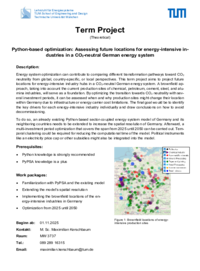Python-based optimization: Assessing future locations for energy-intensive industries in a CO2-neutral German energy system
- Institut
- Lehrstuhl für Energiesysteme
- Typ
- Semesterarbeit
- Inhalt
- Beschreibung
Energy system optimization can contribute to comparing different transformation pathways toward CO2
neutrality from global, country-specific, or local perspectives. This term project aims to project future
locations for energy-intensive industry hubs in a CO2-neutral German energy system. A brownfield approach,
taking into account the current production sites of chemical, petroleum, cement, steel, and alumina
industries, will serve as a foundation. By optimizing the transition towards CO2 neutrality with several
investment periods, it can be assessed when and why production sites might change their location
within Germany due to infrastructure or energy carrier cost limitations. The final goal would be to identify
the key drivers for each energy-intensive industry individually and draw conclusions on how to avoid
decommissioning.
To do so, an already existing Python-based sector-coupled energy system model of Germany and its
neighboring countries needs to be extended to increase the spatial resolution of Germany. Afterward, a
multi-investment period optimization that covers the span from 2025 until 2050 can be carried out. Temporal
clustering could be required for reducing the computational time of the model. Political instruments
like an electricity price cap or other subsidies might also be integrated into the model.Work packages
- Familiarization with PyPSA and the existing model
- Extending the model’s spatial resolution
- Implementing the brownfield locations of the energy-intensive industries in Germany
- Optimization from 2025 until 2050
- Voraussetzungen
- Python knowledge is strongly recommended
- PyPSA knowledge is a plus
- Möglicher Beginn
- 01.11.2025
- Kontakt
-
Maximilian Kerschbaum, M.Sc.
Raum: 3737
Tel.: (089) 289 16342
maximilian.kerschbaumtum.de - Ausschreibung
-
